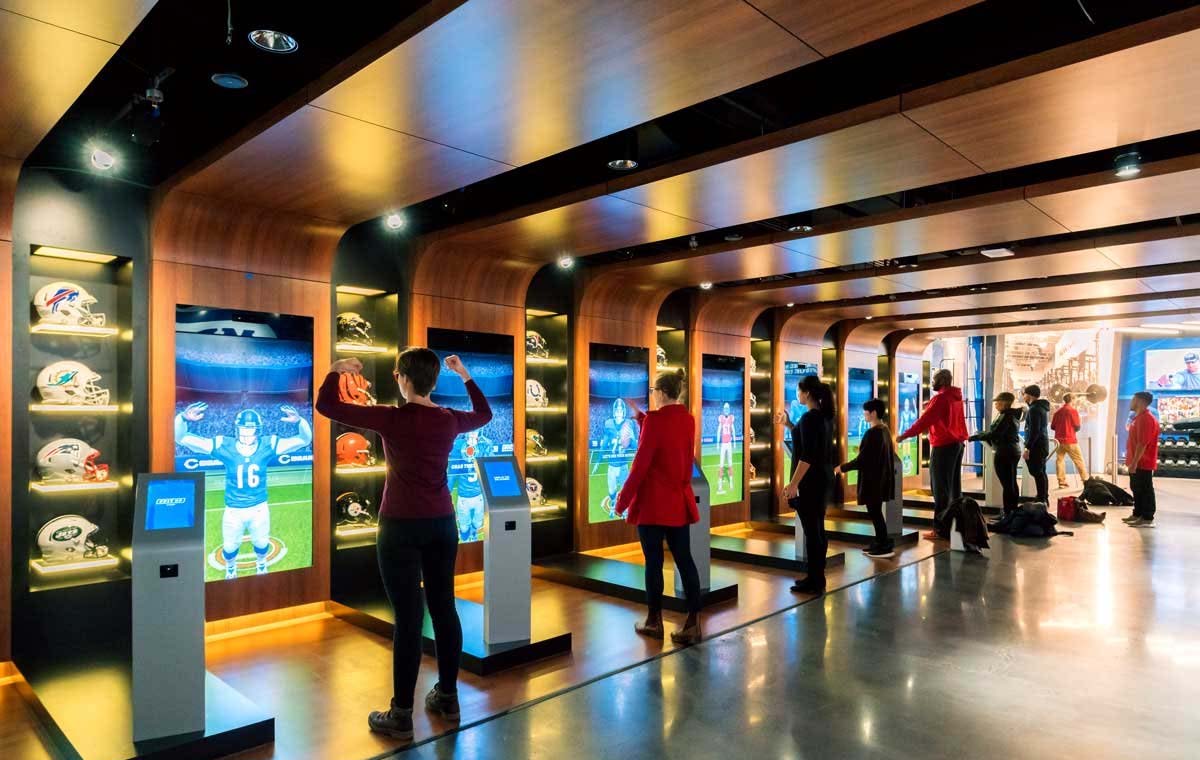In the not-so-distant past, attending a sporting event meant braving the elements, jostling through crowded stadiums, and squinting at distant jumbotrons for replays and statistics. However, the landscape of sports as we know it is changing, thanks in large part to augmented reality.
The integration of AR in sports has revolutionized the fan experience and redefined the business and marketing strategies within the sports industry. Thanks to AR, now – with a simple wave of your smartphone – you can watch your favorite player's statistics come to life in 3D or even stand alongside them on the field. Or slide on a pair of AR glasses and suddenly find yourself courtside at an NBA game or virtually standing on the 18th green at a major golf tournament.
In this article, we delve into the captivating realm of AR in sports, exploring how this cutting-edge technology is redefining the game and revolutionizing the way sports organizations connect with their audience.
AR in Sports: An Overview
AR or Augmented Reality is a technology that overlays digital content on the real world. AR has been widely implemented in sports, with some of the notable developments being golf ball trackers and line judgment in professional tennis and soccer. However, enhancing the fan experience is just one of the ways AR is changing sports. For example, in the NFL, AR technology can track and capture essential data, such as running speed, direction, and acceleration, during live matches. The data can be used by coaches and players to improve performance in a variety of ways.

AR for Sports Fans
AR has opened up new avenues for fan engagement, providing them with an ultra-realistic experience during live sporting events. With immersive experiences, fans can virtually be transported into the game environment, rooting for their favorite team and players. Furthermore, AR-enhanced stadium experiences offer fans a more interactive and exciting way to engage with their teams and players. At SoFi Stadium in Los Angeles, for example, NFL fans can take photos with their favorite players via augmented reality-enhanced photo kiosks. Other examples include personalized messages on big screens, or AR games and mini-tournaments.
Furthermore, with AR, fans can watch replays of thrilling moments from a 360-degree perspective. The technology also provides AR statistics overlays during broadcasts, which enhances the viewing experience. Additionally, custom-made content such as AR-powered fantasy sports and gaming experiences provide fans with personalized engagement, allowing them to have an immersive experience in the sport they love.
AR's Impact on Sports Business and Marketing
AR technology has become a driving force in experiential sports marketing. With branded AR experiences, sponsors can provide an interactive platform for fans to engage with their products and services. Furthermore, data-driven marketing through AR technology can drive fan engagement and interaction with a product.
One benefit of augmented reality is that it helps build brand loyalty through a personalized experience. For instance, stadium visitors can try different team merchandise using AR technology before deciding what to purchase. Or be offered a coupon for the concession stand after using an AR tool at the event. Additionally, AR's impact extends far beyond physical locations and into the global sphere, where teams and leagues can expand their fanbase through AR experiences.
AR and Live Sporting Events
AR is not just for enhancing in-stadium experiences but also provides interactive experiences for virtual attendees. AR live streams and virtual tickets provide remote fans with an avenue to stay connected to live games and also have access to interactivity activities. For example, fans who cannot make it to the stadium can watch the game from home and experience interactive stats and information, delivered through AR technology.
AR technology has also improved in-stadium experiences, with AR navigation and wayfinding making it easier for fans to navigate crowded places and enjoy the match. Additionally, AR entertainment during downtime – including exclusive interactive games that attendees can play while in the stands – keeps fans engaged and entertained throughout the event, adding to the overall experience.
The Potential of AR in Sports
The integration of AR in sports not only offers fans unparalleled immersive experiences but also unveils a new frontier of marketing and business opportunities. For loyal fans who long for nothing more than to feel more connected to their favorite players and teams, augmented reality offers a kind of engagement that would otherwise be impossible. For teams and sports marketers, AR opens the door to expanded fan and player interactions, branding and sponsorship opportunities, and revenue potential.
Ready to leverage AR for your sports brand?
At Bridgewater, we help brands, teams, and institutions of all kinds integrate technology and storytelling into immersive experiences. Make your next AR project unforgettable and uniquely yours by partnering with a full-service experiential design, strategy, and production company that delivers a seamless process across the entire project life cycle. Schedule an introduction to Bridgewater Studio today.


.png)
.png)
.png)







